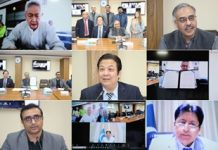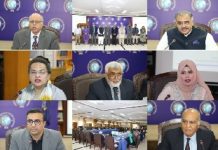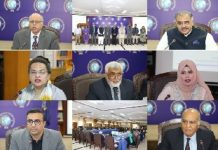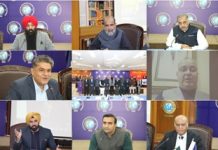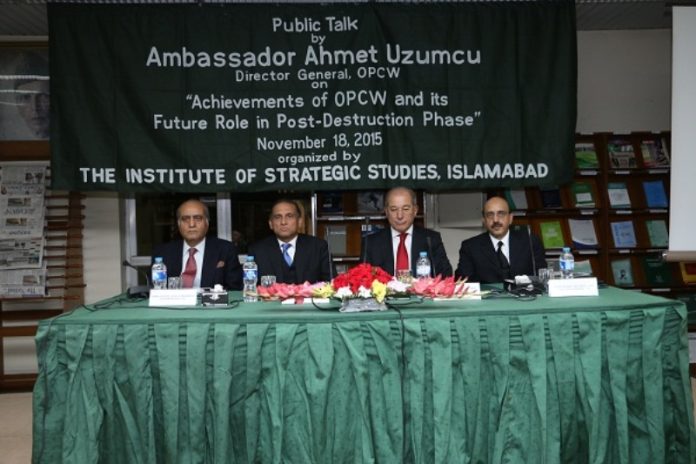The institute of Strategic Studies Islamabad (ISSI) held a Public Talk on “Achievements of Organization for the Prohibition of Chemical Weapons (OPCW) and its Future Role in Post-Destruction Phase” on November 18, 2015.
The high powered delegation from Organization for the Prohibition of Chemical Weapons (OPCW) was led by Ambassador Ahmet Uzumcu, Director General, OPCW. Honourable Aizaz Ahmad Chaudhry, the Foreign Secretary, was also present as a keynote Speaker at the occasion.
Ambassador Masood Khan, Director General, Institute of Strategic Studies, Islamabad (ISSI) opened the inaugural session with his welcome remarks and appreciated the role of OPCW since its inception. He also highlighted the achievements of OPCW under the watch of Ambassador Ahmet Uzumcu.
In his speech, Ambassador Ahmet Uzumcu highlighted the effective role of Pakistan. He appreciated Pakistan’s staunch support for the noble aims of the Convention are making a valuable contribution to realizing a world free of chemical weapons. He further added that Pakistan has been playing an active role, both nationally and regionally, to ensure readiness and preparedness in the event of a chemical attack. Additionally, for several years, Pakistan has been a regional facilitator and a leader in the implementation of Article X. Under CWC Article X, States Parties commit to assist and protect one another from the effects of a chemical weapons attack. Furthermore, he added that Pakistan has been instrumental in sharing expertise and assets for training throughout the region. While discussing the challenges of chemical security, he stated that use of chemical weapons in Syria in August 2013 triggered an extraordinary set of events. Furthermore, the allegations that ISIS has used chemical weapons open a new chapter in the threat posed by chemical terrorism. He concluded his remarks while saying that to meet challenge of the next four years and beyond, we must do so with creativity, resolve and cooperation. For at a time when chemical weapons are still being used to horrific effect, we owe it to ourselves- and future generations- to do away with these weapons once and for all.
Mr. Aizaz Ahmad Chaudhry in his statement stated that the Nobel Prize for Peace awarded to OPCW in December 2013 is indeed a befitting tribute to the dynamic leadership of Ambassador Uzumcu in guiding his Organization through very challenging situations and maintaining an effective disarmament regime, which is aimed at complete elimination of chemical weapons all across the globe. He further added since its entry into force in April 1997, the Chemical Weapons Convention (CWC) represents a remarkable success story in the field of multilateralism and disarmament. While mentioning the contribution of Pakistan, he stated that Pakistan had actively participated in the negotiations to finalize the text of the Chemical Weapons Convention (CWC) in the Conference on Disarmament (CD). In his concluding remarks, he said that Pakistan has full confidence in the leadership of Ambassador Uzumcu and will continue to extend all possible support to him and his esteemed Organization in realizing the objectives of the Chemical Weapons Convention (CWC), particularly during the forthcoming post-destruction phase.
Ambassador Masood Khan earlier said that Pakistan has an impeccable record on chemical weapons. Pakistan plays an active, constructive and supportive role in the OPCW, particularly in regard to the promotion of trade and assistance in the peaceful uses of the chemical industry. Our laws prohibit the development, production, and use of chemical weapons in accordance with its obligations under the CWC; and criminalize the unauthorized transport or transfer of chemical weapons or toxic dual-use chemicals and chemical agent precursors. He further said that Pakistan remains opposed to the use of chemical weapons by anyone under any circumstances, and finds it totally unacceptable. Chemical weapons are a bane and their use is a crime against humanity.
Tahir M. A/18112015




